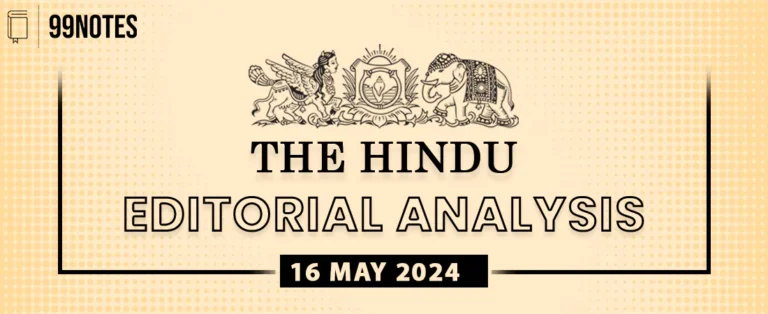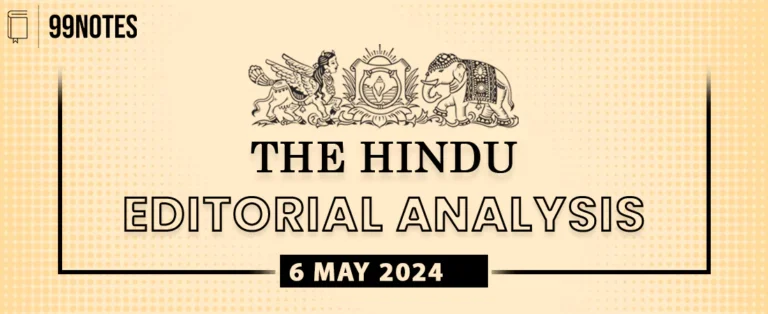15 December 2023 : The Hindu Editorial Notes PDF
The Hindu Editorial
15-December-2023
1. COP28 — Many a slippery slope ahead.
|
Topic: GS3 – Climate Change and Climate Action. This topic is not much relevant in the context of Prelims but more for mains perspective. |
| Context: |
|
COP28 Overview:
- COP28 in Dubai focused on the first five-yearly global stocktake under the Paris Agreement to combat climate change.
- The stocktake covered mitigation, adaptation, financing, and support to developing countries, with countries required to submit raised emissions reduction targets by mid-2025.
Fossil Fuels in Spotlight:
- Fossil fuels, responsible for 75% of greenhouse gases, took center stage at COP28 for the first time.
- Concerns arose about the influence of the oil industry, particularly as the COP was held in the Gulf.
Global Stocktake Findings:
- Reports highlighted the urgency to curb greenhouse gas emissions, given the imminent threat of exceeding the 1.5°C target.
- Draft texts echoed the need for a “deep, rapid, and sustained” reduction in global emissions by 43% by 2030, reaching net-zero CO2 by 2050.
Draft Text Controversies:
- Initial draft texts sparked controversy, especially over the phase-down of fossil fuels.
- The second draft faced backlash for providing only a bullet list of options, leading to heated reactions from various countries and regions.
Compromises and Final Draft:
- The COP was extended, and a new draft was presented, calling for a “transition away” from fossil fuels.
- The final draft, while seen as a compromise, had loopholes allowing for terms like “low-carbon fuels” and “transitional fuels,” with loose definitions.
Financial Support and Loss and Damage:
- The draft expressed concern about the inadequacy of the $100 billion annual commitment by 2020 for developing countries.
- No fresh targets were mentioned, causing dissatisfaction, especially in terms of the new Loss and Damage fund and financial support.
Closing Plenary and Post-Facto Discontent:
- The closing plenary was hastily conducted after the final draft, leaving little time for discussions.
- Voices of discontent emerged post-facto, with delegations expressing objections to the draft’s lax attitude toward fossil fuels and inadequate financial support.
Outcome and Criticisms:
- The COP28 Declaration achieved limited substantive progress, recording a decision to “transition away” from fossil fuels.
- A roadmap for new targets in 2025 was not established, financial assistance was not scaled up, and several crucial documents were not finalized.
Industry and Developed Countries:
- Fossil fuel industry representatives, present in significant numbers, were content with the outcome.
- Developed countries avoided committing substantial funds and dealt another blow to inter-nation equity.
Conclusion:
- COP28 left major issues unresolved, with disquiet among various delegations, including small island states and African nations.
- The relief at the closure, despite criticisms, showcased the challenges in climate COPs.
| PYQ: Critically examine the arguments for and against phasing out coal in India’s energy mix. Suggest a roadmap for achieving a sustainable energy transition. UPSC Mains 2021. |
| Practice Question: How did COP28 address the role of fossil fuels in climate action? Discuss key challenges and outcomes. |
2. COP meetings must use climate science to promote justice and equity
|
Topic: GS3 – Climate Change and Climate Action. This topic is not much relevant in the context of Prelims but more for mains perspective. |
| Context: |
|
COP Evolution:
- Since 1995, COP meetings have transformed from bureaucratic gatherings to inclusive events with diverse participants, reflecting increased awareness of climate change threats.
Diverse Participants:
- Activist groups, indigenous communities, businesses, consultancies, traders, and extensive media presence contribute to the dynamic nature of COP gatherings.
Climate Consensus:
- Global acknowledgment of anthropogenic climate change as an existential threat has marginalized climate denialists, making renewable energy a mainstream focus.
Dubai Consensus:
- The Dubai Consensus, after nearly three decades, recognizes the urgent need to cut fossil fuel use as the dominant source of greenhouse gas emissions (GHGs).
Political Challenges:
- Political expediency and strategic considerations have delayed COP’s acknowledgment of the link between emissions and fossil fuel use.
Complex Dynamics:
- Countries emphasize emissions reduction based on rising temperatures but resist accepting links when reparations are sought for climate-induced devastations.
Loss and Damage Fund:
- The Loss and Damage Fund, hailed as a COP28 success with $750 million commitments, is conditioned not to be considered compensation for historical carbon pollution.
Historic Phrases vs. Action:
- COP meetings are labeled ‘historic’ for introducing emission-cutting phrases but fall short in addressing the inadequate funds and technology for fossil fuel de-addiction.
Call for Justice and Equity:
- Future COP meetings should leverage science to promote justice, equity, and increased commitment to fossil fuel de-addiction.
| PYQ: Analyze the role of civil society, non-governmental organizations and the media in raising awareness and advocating for action on climate change. UPSC Mains 2023 |
| Practice Question: How has the character of COP meetings evolved since 1995, and what challenges persist in addressing fossil fuel use? |
3. Is India doing enough to tackle climate change?
|
Topic: GS3 – climate change and climate action. This topic is not much relevant in the context of Prelims but more for mains perspective. |
| Context: |
|
Historic Agreement at COP28:
- All 198 signatories agree to “transition away” from all fossil fuels, a shift from previous emphasis on coal, marking a historic development.
India’s Role in COP28:
- India played a pivotal role in modifying language at COP26, changing “phasing out” coal to “phasing it down.” In COP28, India supports the transition away from oil and gas.
UAE Consensus and Loss and Damage Fund:
- The UAE Consensus at COP28 emphasizes transitioning away from fossil fuels in an orderly manner. The Loss and Damage Fund, operationalized with $700 million, is considered a major victory.
Challenges and Loopholes:
- While the COP28 outcomes are historic, challenges persist, with loopholes such as reliance on technologies like carbon capture and low-carbon hydrogen, potentially prolonging fossil fuel industry activities.
Evaluating COP28 Reasonableness:
- Views on COP28 outcomes differ; some see it as weak in ambition. Developing countries, including India, face challenges in financing and effective de-carbonization, especially in sectors like technology transfer.
India’s Catch-22 Situation:
- India, a significant emitter, faces a dilemma in balancing its economic growth paradigm with climate impacts. The focus on GDP and the trade-off between livelihoods and the environment pose challenges.
Environment in Growth Paradigm:
- The discourse on growth paradigms suggests a need for environmental centrality. While acknowledging the developmental challenges, a shift toward a sustainable model is urged.
India’s Contribution and Soft Power:
- India, as a regional power and emerging economy, is expected to contribute to the Loss and Damage Fund. While monetary contributions are vital, India’s soft power, knowledge transfer, and engagement with the Santiago network are emphasized.
Balancing Charity at Home and Global Contribution:
- The imperative for charity to begin at home is noted, highlighting the importance of addressing local needs. However, India’s role in the global arena, especially in contributing to the Loss and Damage Fund, is acknowledged.
India’s Engagement and Learning:
- India’s increased engagement in the development of the Loss and Damage Fund is recognized. India is encouraged to contribute not only monetarily but also by being part of global networks and learning from experiences of other nations.
Sustainable Development Paradigm:
- The need for India to establish its developmental paradigm with a focus on the environment is emphasized. The discourse on de-growth is mentioned, urging a shift away from destructive models of development.
For Enquiry

15 Dec 2023 : Daily Quiz

15 Dec 2023 : Daily Answer Writing

15 Dec 2023 : Indian Express

15 December 2023 : The Hindu Editorial Notes PDF

15 Dec 2023 : PIB

15 Dec 2023 : Daily Current Affairs

Article 330A: Reservation of seats for women in the House of the People

Article 269A: Levy and collection of goods and services tax in course of Inter-State trade or commerce

Article 275: Grants from the Union to certain States

Article 279A: Goods and Services Tax Council
Daily Quiz 15 Dec 2023 : Daily Quiz 15 Dec 2023 : Daily Quiz…
mains answer writing 15 Dec 2023 : Daily Answer Writing Mains Answer Writing
15-December-2023
Q1) “If there is one thing that embodies India’s civilizational…
december 2023 indian express 15 Dec 2023 : Indian Express Indian Express
15- December-2023
1. The nature of the future
Topic: GS3 – Environment
Context:
The…
December 2023 The Hindu 15 December 2023 : The Hindu Editorial Notes PDF The Hindu Editorial
15-December-2023
1. COP28 — Many a slippery slope ahead.
Topic: GS3 – Climate…
December 2023 Pib 15 Dec 2023 : PIB PRESS INFORMATION BUREAU
15-December -2023
1. Over the last three years, ISRO has been steadily leveraging…
Daily Current Affairs 15 Dec 2023 : Daily Current Affairs Daily Current Affairs
15-December-2023
1. Allahabad High Court Approves Survey in Sri Krishna Janmabhoomi-Shahi…
Articles Article 330A: Reservation of seats for women in the House of the People Article 330A of Indian Constitution
Article330A: Reservation of seats for women in the House of the People.
Seats…
Articles Article 269A: Levy and collection of goods and services tax in course of Inter-State trade or commerce Article 269A of Indian Constitution
Original Text:
(1) Goods and services tax on supplies in the course…
Articles Article 275: Grants from the Union to certain States Article 275 of Indian Constitution
Original Text:
(1) Such sums as Parliament may by law provide shall…
Articles Article 279A: Goods and Services Tax Council Article 279A of Indian Constitution
Original text:
(1) The President shall, within sixty days from the…




